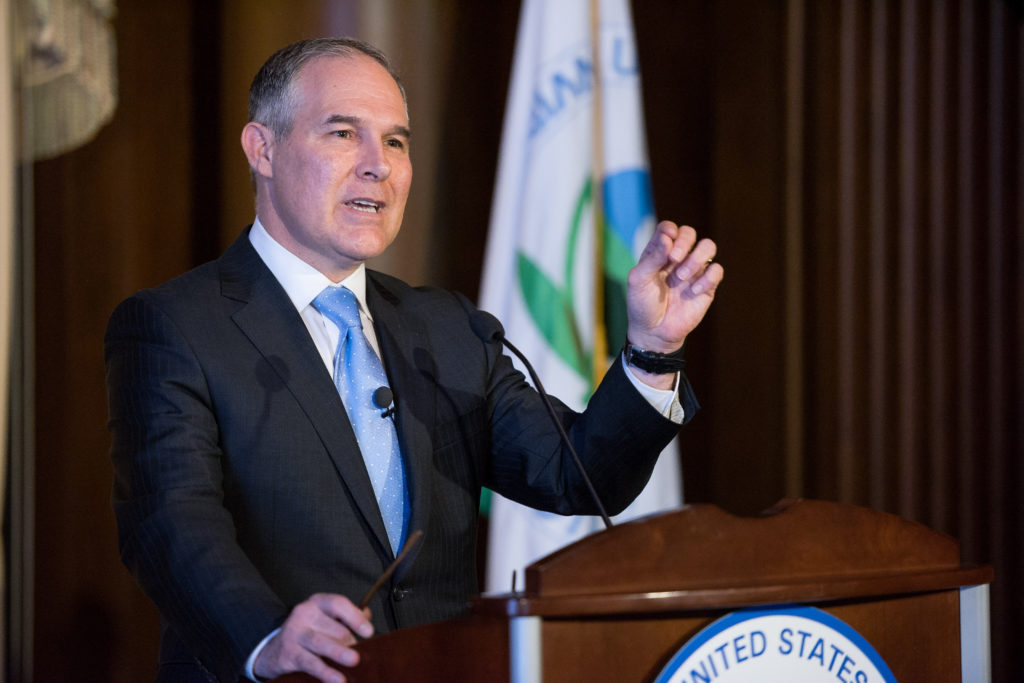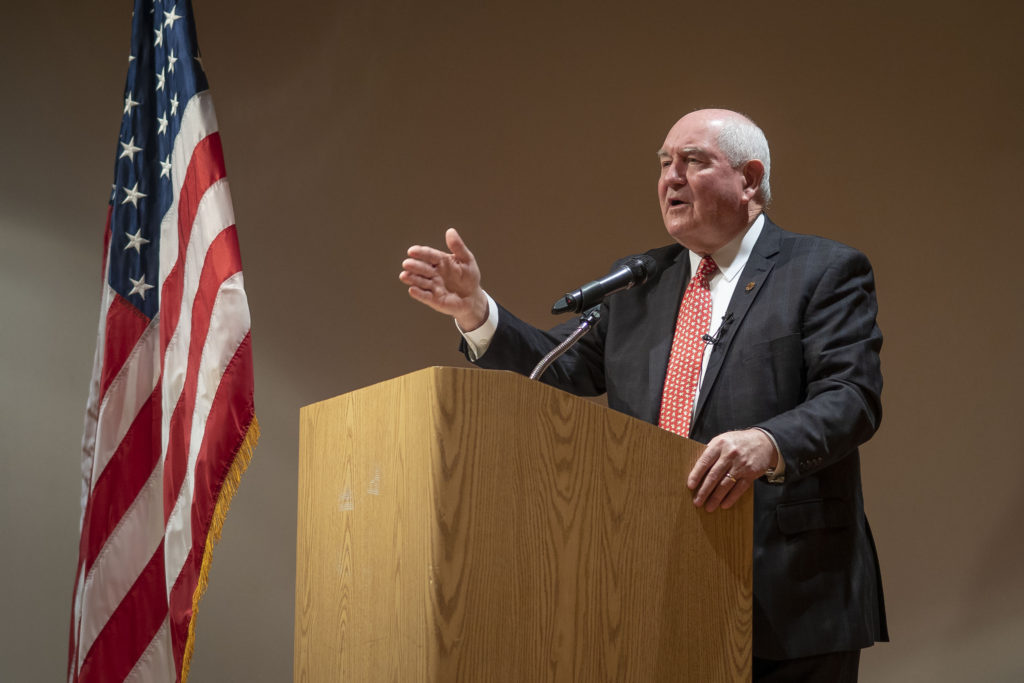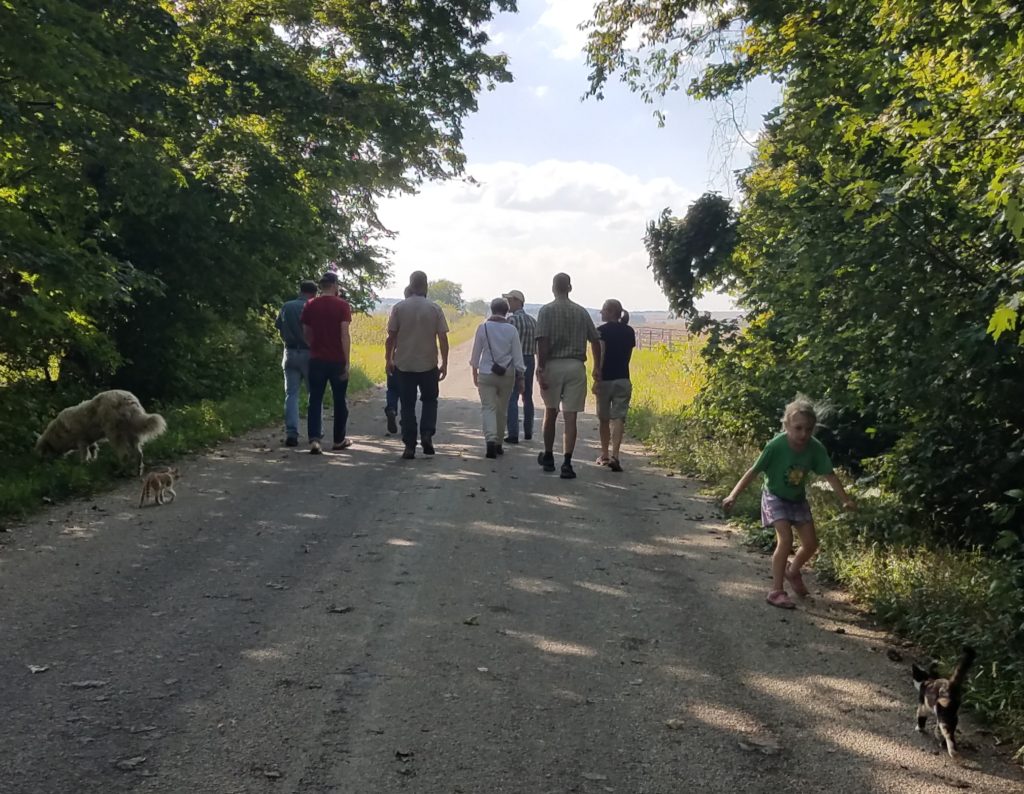I’ve noticed that by and large the culture of Christians who care about God’s earth is one of love, kindness, patience, and thoughtfulness. A byproduct of this culture, however, can sometimes be the tendency to avoid speaking truth in love to other Christians who cause needless harm to God’s earth.
So how do we respond to Sonny Perdue and Scott Pruitt? These two prominent Christians are in positions of leadership at the nexus of economy, government policy, and God’s earth. From what I have seen, they often advance and maintain policies counter to our convictions. Their decisions, their actions, and their inaction dwarf any smaller efforts of ours.
Will we continue to be polite and courteous and avoid the elephant in the room? Or do we speak up in a way that contains truth in proportion to the scale of the harm being done? And how do we do that while still being Christian?
The open letter below to the pastors of Sonny Perdue and Scott Pruitt is my best attempt. I chose to address the pastors because I believe that churches hold responsibility for the way their members, especially prominent members, live out their faith.
Dear Pastors Nick Garland and JIm Perdue:
I am having a hard time understanding something. I hope you can help me.
You are the pastors of Scott Pruitt, the Environmental Protection Agency Administrator for the United States, and Sonny Perdue, the Secretary of Agriculture. These members of your churches profess their Christian faith sincerely and prominently. Secretary Perdue even described this opportunity to serve our county as a call from God.
What I have a hard time understanding is how they came to believe that serving Jesus in their lives of leadership meant going along with policies that serve powerful economic interests at the cost of harming vulnerable people and spoiling God’s earth.
Can you help me understand that?

Environmental Protection Agency Administrator Scott Pruitt (photo courtesy of US Environmental Protection Agency)
I know those words sounds harsh and judgmental. I would guess that you and your congregation feel pride that members of your churches would reach such high levels of accomplishment. You are probably already dismissing me as one of “those” Christians.
But please hear me out. I want to speak what I believe is the truth in love. I believe it is important for Christians to see God’s will done on earth. I believe it is especially important that Christians who are prominent live out a whole Christian faith their words and deeds that is an attractive testimony to the Christian faith.
Secretary Perdue recently called a jury award in the case of people around a factory farm in North Carolina “despicable.” As you may know, concentrated animal feeding operations (CAFOs) holds thousands of farm animals together in factory-like buildings. Agriculture industry leaders point out these factories give our economy cheap meat. But what is not considered in the cheap prices is the cruelty to God’s animals. Nor do the cheap prices make up for the large streams of waste generated by the confined animals that often pollute streams and foul ground water that neighbors downstream need for drinking.

Sonny Perdue, Secretary of the U.S. Department of Agriculture (photo courtesy of the USDA)
Did you know that most antibiotics today are not consumed by people but are given to animals, especially those in factory farms, because they promote unnaturally fast animal growth? This overuse is leading to the outbreak of strains of bacteria, like Staphylococcus aureus (known as MRSA), that are resistant to antibiotics. This is leading to the painful deaths of thousands, like 18-month old Simon Macario in Chicago.
CAFO farms also generate awful smells that cause misery to their neighbors while reducing their property values. Oftentimes, the neighbors of CAFOs are poor and minorities who find it harder to get justice and protection.
CAFOs are just a symptom of our industrial agriculture system. This system has generated great productivity. It has also compromised our public health and God’s earth and emptied out our rural towns. In many ways, as John Ikerd has pointed out, this system has put priority on faith in the market economy over faith in God and over concern for the wellbeing of our neighbors and God’s earth. I have not seen any indication that Secretary Perdue has wrestled with these questions and our country’s industrial approach to agriculture.
For his part, Administrator Pruitt has consistently looked to weaken restraints on business that have otherwise protected people and God’s land, water, and wildlife. A recent example was his decision to exempt Foxconn’s planned 20-million square foot electronics plant in southeastern Wisconsin from rules in place to reduce the emission of smog pollution that harms people’s lungs. This was despite the recommendations of his staff. Pruitt has also shown a consistent tendency to favor powerful industries, even to the point of ethical transgressions.
What you and I have in common is faith in Jesus. Through this belief and trust, the Spirit begins to transform every dimension of our hearts and our lives.
One of the concepts that Jesus taught was that fruit in the form of words and deeds revealed the condition of a person’s heart. Secretary Perdue and Administrator Pruitt profess their Christian faith emphatically. But I see the fruits revealed in key policies they are responsible for to be counter to the God I see in the Bible.
As I know you know, there is a consistent theme throughout the Bible of God’s concern for the poor, vulnerable, and marginalized. These were the people to whom Jesus reached out. Prophets spoke against powerful people like Ahab and Jezebel who misused their power to rob vulnerable people of their integrity and what had been promised them by God. In Psalm 104 and in Job we also see God concerned with and revealed in all of Creation, the Creation that God included in this covenant with Noah in Genesis 9.
So I have sincere questions for you:
Do you believe that what your members are doing in their public roles as it relates to God’s earth and vulnerable people is God’s will?
If yes, is that because of the concept of dominion you teach? Have you considered the nuances of the whole Bible as it relates to our relationship to God’s earth? Have you considered God’s model for dominion over us as seen in Jesus’ life, death, and resurrection?
If yes, is that because you believe that God would never allow things he cared about to be destroyed or harmed? Am I wrongly reading Jesus’ response to the Tempter in Matthew 4:7, which shows that God does not exist to save us from purposeful folly?
Will you address Secretary Perdue and Administrator Pruitt and urge them to exhibit the fruits of the Spirit and demonstrate their first allegiance to God’s ways rather than to the interests of the powerful?
Are you concerned that the actions and words of Secretary Perdue and Administrator Pruitt might be the reason people who naturally respond to the beauty of God’s earth are being turned away from coming to faith in Jesus? Could these people know in their hearts the truth that it is wrong to do unnecessary violence to the beauty and complexity of God’s order in Creation?
Francis Shaeffer wrote, “Thus God treats His Creation with integrity: each thing in its own order, each thing the way He made it. If God treats His creation in that way, should we not treat our fellow-creatures with similar integrity? If God treats the tree like a tree, the machine like a machine, the man like a man, shouldn’t I, as a fellow-creature, do the same thing – treating each thing in integrity in its own order? And for the highest reason: because I love God – I love the One who has made it! Loving the Lover who has made it, I have respect for the thing He has made.”
If you look closely you will find that many of the policies of the Department of Agriculture and of the EPA under Secretary Perdue and Administrator Pruitt do not have respect for the things God has made.
What does God make of that?
Above all, can you help Secretary Perdue and Administrator Pruitt question the assumptions behind their policies?
They are in a unique positions to lead good stewardship of God’s earth and to reveal to millions of people what Christian stewardship really looks like. They could be amazing witnesses to the regenerative and restorative power that God offers us and offers the world.
You are their pastors. You are in unique positions to counsel them, open their hearts in humility and sensitivity, and give them the courage to consider carefully what kind of lives God would want them to lead. Without doubt, It takes courage to go against the principalities of this world who tempt bright and charismatic people with riches and crowns.
I know that Secretary Perdue and Administrator Pruitt are probably very decent people in many respects. I know, too, this letter likely challenges how each of you and your churches read the Bible. It may challenge how you think about the connection between Christians, the economy, and the role of government. And I want you to know I know I don’t live out my Christian faith perfectly. I have failings. You could build a cabin with the logs in my eyes.
Nevertheless, please be open to whatever measure of God’s truth I have been able to include in this letter.
I hope, too, you will pray with me for the day when Christians are known for wholly transformed lives that testify to their love of God through their love of their neighbors and their energetic efforts to prosper the life of God’s good earth.
Sincerely,
Nathan Aaberg







